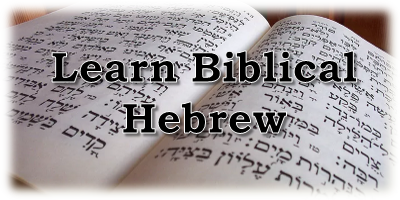Adjectives
An adjective is a word that provides description to a noun. For instance, the Hebrew word טוֹב is a common adjective such as in the phrase יוֹם טוֹב (a good day, 1 Samuel 25:8). Notice that in Hebrew the adjective follows the noun it is describing. If the noun is preceded by the article ה (as a prefix) then, the adjective will as well, such as in הָהָר הַטוֹב (the good mountain, Deuteronomy 3:25).
The adjective will also match the gender of the noun. In the last two examples, the word יוֹם and הַר are masculine nouns therefore, the masculine form טוֹב is used. The word אֶרֶץ (land) is a feminine word so the feminine טוֹבָה is used in the phrase אֶרֶץ טוֹבָה (a good land, Exodus 3:8). The adjective will also match the number (masculine or singular) of the noun. In each of our previous examples the singular form of the word טוֹב is being used because the noun it is describing is also singular. In the phrase בָּתִּים טוֹבִים (good houses, Deuteronomy 8:12) the word בֵית (house) is used in the plural form therefore, the adjective is as well.
In the phrase הַמֶּלֶךְ טוֹב the word מֶלֶךְ (king) is prefixed by the article ה (the) but, the word טוֹב is not. In this case the word טוֹב is not being used as an adjective but as a noun and should therefore be translated as "the king is good" or "the king is pleased" (Nehemiah 2:5).
It should be kept in mind that Biblical Hebrew does not really like adjectives but instead prefers to provide description by using verbs since the Ancient Hebrew mind describes things by their function and purpose rather than their appearance.
Some common Biblical adjectives are as follows.
|
Fem.
| |
Masc.
| |
Meaning
|
|
טוֹבה
| |
טוֹב
| |
good
|
|
רָעָה
| |
רָע
| |
bad, evil
|
|
גְּדוֹלָה
| |
גָּדוֹל
| |
great, large
|
|
קְטַנָּה
| |
קָטַן
| |
small, little
|
|
זֹאת
| |
זֶה
| |
This
|
|
הַהִיא
| |
הַהוּא
| |
That
|
|
אֶל / אֵלֶּא
| |
אֶל / אֵלֶּא
| |
These, Those
|
Interogratives
Questions in Hebrew can easily be identified by one of the following words which will begin a sentence.
|
מִי
| | Who |
|
מָה
| | What |
|
מָתַי
| | When |
|
אֵיפֹה / אֵי
| | Where |
|
לָמָּה
| | Why |
|
אֵיךְ
| | How |
A sentence can also begin with what is called the "interogative Hey". This is the letter ה being prefixed to a word. As an example, the Hebrew word יְדַעְתֶּם (Genesis 44:15) would be translated as "you know" but, if it is prefixed by the interogative hey it would appear as הַיְדַעְתֶּם (Genesis 29:5) and be translated as "do you know?"



